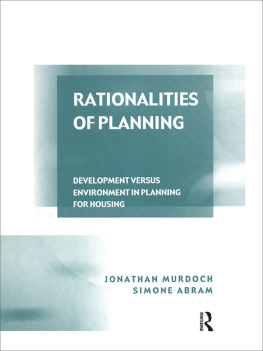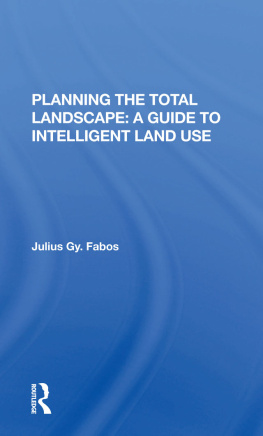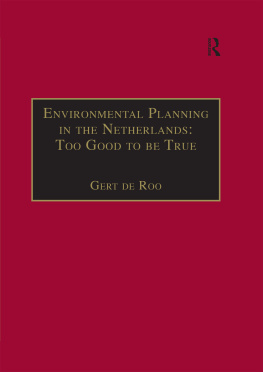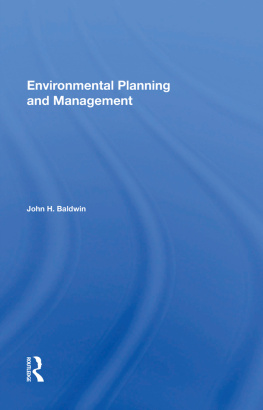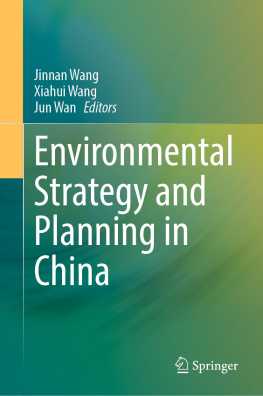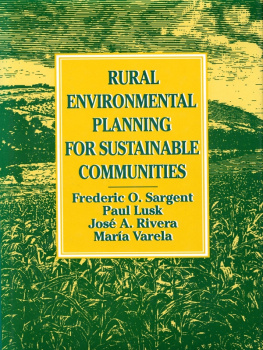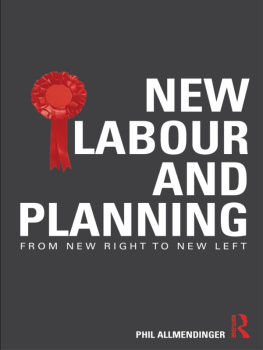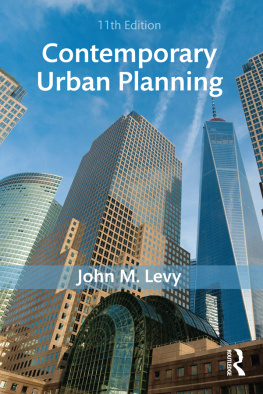Studies in Economics and Political Science
Volume 1
Environmental Planning
First published in 1975 by George Allen & Unwin Ltd
This edition first published in 2022
by Routledge
2 Park Square, Milton Park, Abingdon, Oxon OX14 4RN
and by Routledge
605 Third Avenue, New York, NY 10158
Routledge is an imprint of the Taylor & Francis Group, an informa business
1975 George Allen & Unwin Ltd
All rights reserved. No part of this book may be reprinted or reproduced or utilised in any form or by any electronic, mechanical, or other means, now known or hereafter invented, including photocopying and recording, or in any information storage or retrieval system, without permission in writing from the publishers.
Trademark notice: Product or corporate names may be trademarks or registered trademarks, and are used only for identification and explanation without intent to infringe.
British Library Cataloguing in Publication Data
A catalogue record for this book is available from the British Library
ISBN: 978-1-03-212459-9 (Set)
ISBN: 978-1-00-322951-3 (Set) (ebk)
ISBN: 978-1-03-212430-8 (Volume 1) (hbk)
ISBN: 978-1-03-212465-0 (Volume 1) (pbk)
ISBN: 978-1-00-322464-8 (Volume 1) (ebk)
DOI: 10.4324/9781003224648
Publishers Note
The publisher has gone to great lengths to ensure the quality of this reprint but points out that some imperfections in the original copies may be apparent.
Disclaimer
The publisher has made every effort to trace copyright holders and would welcome correspondence from those they have been unable to trace.
Environmental Planning
A Political and Philosophical Analysis
Lincoln Allison
University of Warwick
First published in 1975
This book is copyright under the Berne Convention. All rights are reserved. Apart from any fair dealing for the purpose of private study, research, criticism or review, as permitted under the Copyright Act 1956, no part of this publication may be reproduced, stored in a retrieval system, or transmitted, in any form or by any means, electronic, electrical, chemical, mechanical, optical, photocopying, recording or otherwise, without the prior permission of the copyright owner. Inquiries should be addressed to the publishers.
George Allen & Unwin Ltd 1975
ISBN 0 04 329021 3 hardback
ISBN 0 04 329022 1 paperback
Printed in Great Britain
in 10 point Plantin type
by T. and A. Constable Limited, Edinburgh
For
A. M. Mc.
Preface
This book is an essay on the relationship between environmental planning and political theory in Britain, though I hope it will be relevant to any society or to any situation in which there are environmental issues. Apart from its specific use for students of environmental planning and students of political theory, it is intended to interest anyone who is concerned with the relationship between political theory or philosophy and policy-making.
Because of the breadth of the subject-matter, I have not appended a bibliography; I hope that the notes will prove an adequate substitute. I have noted all references and sources which are essential to my analysis, except where a statement or argument is so widely quoted as to require no reference. I have sometimes used notes to make a point or to quote a passage which I consider to be relevant, but which would break up the thread of argument if incorporated into the text.
As this essay is the product of work begun (at Nuffield College, Oxford) in 1968 and continued throughout the period since, the number of people to whom I am indebted for information and stimulation is too large for me to mention individuals. A list, if constructed, would include politicians, planners, administrators, pressure-group officials and members of academic departments of Economics, History, Law, Literature, Management Science, Philosophy, Politics, Sociology and Town and Country Planning.
I would, however, like to thank the Department of Politics of the University of Warwick for allowing me to teach a course on the Political Aspects of Environmental Planning, and the students who have taken the course for the interest they have shown.
L. A.
Chapter 1 The Environment Fashion
This book is a sign of, and part of, a general intellectual concern about the relationship between man and his physical environment. The concern is not new; it has existed whenever and wherever there have been industrial development and urbanisation. But it has grown considerably in the industrial countries and Britain in particular since the mid-1960s. One aspect of the growth is that many people have rejected the established definitions of the important issues in politics. I myself reacted strongly in the mid- and late 1960s against what I took to be the triviality of contemporary political debate. The size and distribution of National Incomeor baking and cutting of the National Cake as it was often calledseemed to preoccupy politicians who paid little or no attention to the fundamental problems of environmental change. I soon discovered that my sentiments were neither new nor uncommon. Indeed, they had been forcibly expressed in 1929 by D. H. Lawrence in his essay, Nottingham and the Mining Country:
The real tragedy of England, as I see it, is the tragedy of ugliness. The country is so lovely: the man-made England is so vile ... make a new England. Away with little homes! Away with scrabbling pettiness and paltriness. Look at the contours of the land, and build up from these, with a sufficient nobility. The English may be mentally or spiritually developed. But as citizens of splendid cities they are more ignominious than rabbits. And they nag, nag, nag all the time about politics and wages and all that, like mean narrow housewives.
After about 1967 the emphasis changed. At least on the periphery of politics, in the media, the universities and among administrators there was something of an environment fashion. By 1973 it was orthodox in polite circles to believe that population must be publicly controlled in the long run, and to claim that something must be done about the motor car. Ten years earlier the last of these beliefs was considered trivial and the first two were positively disreputable (though they were both over a century old).
It would be useful if social science could explain such changes in attitudes and beliefs, but we cannot do so with satisfactory precision. Causes and effects cannot be adequately distinguished: an influential book is probably both because it must be acceptable or plausible in order to be influential. We can, however, point to certain crucial landmarks. In 1967, E. J. Mishans The Costs of Economic Growth and the reform of laws concerning homosexuality, abortion and divorce in the period 1964-70 must find the same problem: it is easy to point to landmarks, very difficult to assess their importance.
The contribution of the academic study of politics to the environment controversy has been slight; this is especially true of political theory. This paucity represents not merely a missed opportunity for scholars, but something of an intellectual catastrophe. Planning problems are misunderstood if they are thought of as technical problems to be solved by planners, architects, biologists, chemists or ecologists. As I shall argue in Chapter 2, they are really political problems in every sense. Because the dimension of political theory has been absent from much of the debate, there has been a mis-emphasis on the more melodramatic possibilities of environmental catastrophe: the Doomwatch Syndrome as it has been called. The implication of the Syndrome is that we are faced with environmental catastrophe. Environmental issues are, therefore, technical. The goal is simplesurvivaland the knowledge about how to survive is furnished by natural science. Managing the environment is thus no more political than keeping a car on the road.





